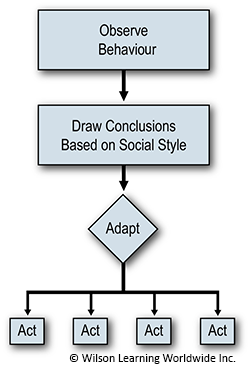Styles de travail
Today's workplace continues to grow more culturally, educationally and philosophically diverse. Research shows that a manager's ability to deal with different Social Styles has a direct impact on workgroup effectiveness and satisfaction. Managers need to model interpersonal versatility to ensure that their workgroups remain productive. This module will help managers communicate with and respond to different styles, increasing their versatility to work together for top performance.
Leading for Performance-Working Styles: Dimensions of Social Style (LFP-WS) is based on the Social Style model, with its four distinct interactive styles: Driver, Analytical, Amiable and Expressive. LFP-WS provides proven skills for identifying Social Style, recognising each style's strengths, and developing interpersonal versatility to adapt one's own behaviour and work more effectively with others.
Programme Outcomes
Further Reading:
A manager's versatility directly links to work unit performance and satisfaction. Leading for Performance-Working Styles: Dimensions of Social Style will benefit any organisation by showing a manager how to communicate better and improve teamwork and cooperation.
Approach
Leading for Performance-Working Styles: Dimensions of Social Style is a one-day instructor-led module that can be facilitated by Wilson Learning or by a leader-trained in-house professional.
This enables:
- Face-to-face interaction among the participants and the facilitator
- True-to-life skills practice with immediate in-person feedback
- The opportunity for real-time commitment to action
A highly recommended option and a key component in LFP-WS is the Social Styles Profile, which will profile the participant by means of Social Style and Versatility.
Enabling Improved Performance
Leading for Performance-Working Styles: Dimensions of Social Style features various performance applications, reinforcement and support tools so participants can fine-tune and apply skills and behaviours on the job. Involving management and training them to coach is key for successful implementation.
To discover how we ensure learning is reinforced and applied for improved performance, see our Learning Transfer Approach.
Measurement and Evaluation
Organisations that implement Leading for Performance-Working Styles: Dimensions of Social Style have access to a broad range of tools to measure initial behavioural changes and business results. For LFP-WS, one approach may be a web-based survey of participants to identify the degree of change and the differences this change makes.
To learn more about measuring the impact of learning, visit Measurement and Evaluation Services.




 Se il vous plaît remplir ce formulaire pour télécharger la fiche d'information pour Styles de travail».
Se il vous plaît remplir ce formulaire pour télécharger la fiche d'information pour Styles de travail».



